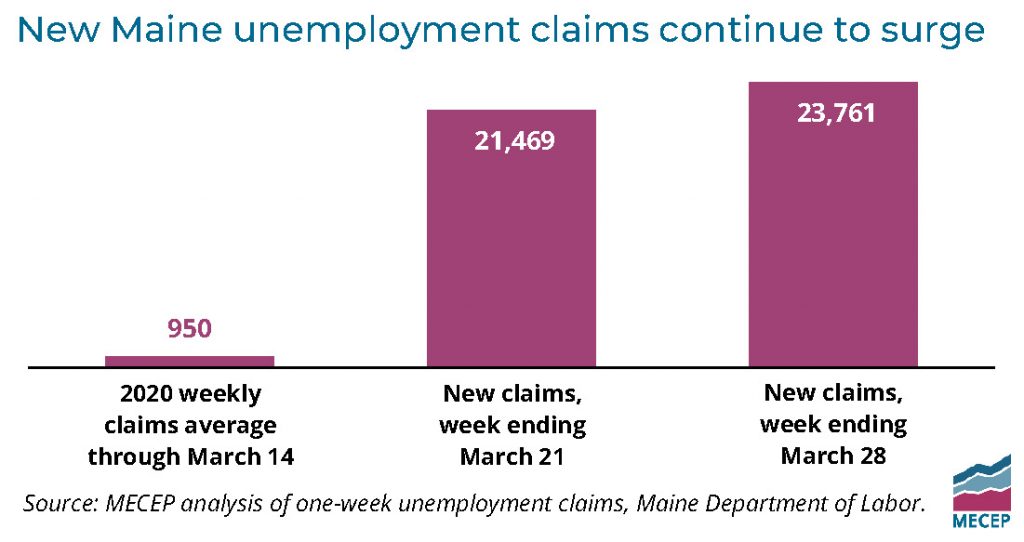On March 27, President Trump signed the Coronavirus Aid, Relief and Economic Security, or CARES, Act into law. The $1.8 trillion package contains a number of provisions to help workers and families weather this unprecedented period of economic contraction.
Included in those measures is an expansion of eligibility for unemployment benefits, as well as supplemental payments for all claimants. MECEP estimates those supplemental payments will total $508 million for almost 56,000 Mainers receiving unemployment compensation through the end of July.[1]
These changes to the Unemployment Insurance system are sorely needed, given two consecutive weeks of record-breaking claim filings in Maine. The CARES Act will bolster action taken by the state Legislature in March to temporarily eliminate the usual one-week waiting period for benefits, waive work search requirements, and extend benefits to workers on temporary leaves of absence as a result of COVID-19.
The CARES Act creates three new programs to supplement the existing Unemployment Insurance system. The new programs have similar names, but achieve distinct objectives: increasing payment sizes, extending the duration of benefits, and expanding eligibility.
The new programs are 100 percent-funded by the federal government but will be administered at the state level. That’s important because while the Act creates three new programs, Mainers will still only have to apply once through the Maine Department of Labor website.
Larger payments
The biggest provision in the CARES Act is a temporary $600 per week boost in unemployment benefits for all claimants. This program, known as Pandemic Unemployment Compensation, is paid in addition to the usual state benefit. It can result in a benefit higher than the state maximum of $445 weekly, and . This program is in effect until July 31, 2020. Importantly, this additional payment does not count as earnings for MaineCare eligibility.
Example: A restaurant worker who usually earns $520 a week would receive $307 per week in regular state unemployment benefits, plus an additional $600 a week through July 31, for a total of $907 per week.
Example: A mid-level manager who usually earns $1,100 a week would receive $445 per week in regular state unemployment benefits (the state maximum). The additional $600 per week brings that to $1,045 per week through July 31.
Extended benefit period
Another program, Pandemic Emergency Unemployment Compensation, provides an additional 13 weeks of benefits to anyone who exhausts their 26 weeks of Maine state benefits. New claimants could therefore claim up to 39 weeks of benefits.
It is likely that unemployment benefits will be extended for an additional 13 weeks (for a total of 52 weeks), if the pandemic and the resulting unemployment last for a substantial period of time. Under Maine state law, state unemployment benefits are extended if, over a 13-week period, the headline unemployment rate exceeds 5 percent or the number of benefit claimants is 20 percent higher than in the same period last year. The earliest this provision could be triggered is June 13.
Expanded eligibility for the self-employed , small business owners, gig workers, and new hires
Finally, the CARES Act includes a program to cover workers who don’t usually qualify for unemployment compensation. This program, called Pandemic Unemployment Assistance, makes payments available to workers who either do not usually qualify for state unemployment compensation, or who had used up their 26 benefit weeks before the outbreak of COVID-19.
A large number of unemployed Mainers do not typically qualify for unemployment compensation. For example, over the twelve months ending February 2020, an average of 22,000 Mainers were unemployed. Yet the average number of unemployment claimants was just under 6,000, or 27 percent of the total number of unemployed.
Those usually excluded include people without enough earnings history to qualify, self-employed workers and small-business owners, and those with very low earnings. Pandemic Unemployment Assistance will be available to these workers for up to 39 weeks until December 31, 2020. Eligible circumstances include a broad range of conditions related to COVID-19, such as having symptoms yourself, caring for someone who has a diagnosis, caring for a child whose school is closed, or being unable to work because your employer is closed.
Benefits under this program will be calculated differently. Self-employed workers will likely have to provide two years of tax returns to show usual earnings. Those without an earnings history will receive the minimum benefit, which is half of Maine’s average unemployment benefit. In Maine, that minimum benefit will be around $174 per week. The maximum benefit would be the state cap of $445 per week
Example: A self-employed electrician who usually earns $1,032 a week would be ineligible for regular state unemployment compensation. However, they would qualify for Pandemic Unemployment Assistance at the 59 percent rate, capped at the state maximum of $445 per week. Through July 31st, they would also receive an additional $600 per week, for a total of $1,045 per week.
Example: A newly hired restaurant server doesn’t have enough earnings history to qualify for regular state unemployment compensation. They would receive the minimum PUA amount of $174 per week. Through July 31, they would also receive an additional $600 per week, for a total of $774 per week.
Maine Department of Labor adapting to changes
The Maine Department of Labor is working to implement the provisions of the CARES Act into the state unemployment system at the same time that they are trying to respond to unprecedented levels of claims. Newly eligible individuals such as self-employed workers, small business owners, and gig economy workers should make sure the system is updated before filing a claim since claims filed before the system is updated will be denied. For more information, see the Maine DOL website.
Notes:
[1] This estimate is based on methodology developed by The Century Foundation, using updated estimates of unemployment in Maine by the Economic Policy Institute. The estimate assumes that 87,192 Mainers will be unemployed by July, of whom an average of 64% receive the additional Pandemic Unemployment Compensation.




